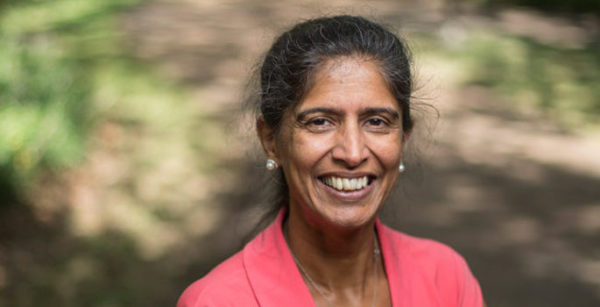
The Vanderbilt Biophotonics Center, directed by Anita Mahadevan-Jansen, Orrin H. Ingram Professor of Biomedical Engineering, conducts research on clinical photonics, neurophotonics and multiscale photonics to develop optical technologies that improve patient care.
When Vanderbilt ramped down in-person research activities in mid-March due to the COVID-19 pandemic, Mahadevan-Jansen and her team did not know when they would be back, so they methodically preserved research experiments through a seamless ramp-down. While preparing the lab for closure was not difficult, the team’s two-month absence created complex academic and financial challenges that they continue to work to overcome. Motivated to resume their experiments, the team eagerly returned in mid-May during Phase I of Research Ramp-up, restoring a sense of purpose to their dynamic research community.
When preparing to ramp down the VBC, lab members worried about the impact of possible power outages on experiments, so they created duplicates of cell cultures, freezing half of them in the W.M. Keck Free Electron Laser Center and half in the cell storage facility in the Department of Cell and Developmental Biology. Two research staff who live close to campus attended to cell cultures that could not be kept frozen and to equipment that needed to continue running. Another researcher whose appointment was ending in June received special permission to finish his experiments before leaving Vanderbilt. Until everyone returned to the lab, he assisted in maintaining cell cultures and proactively picked up mail at Station B, including expensive equipment that typically would have been delivered to the lab.
With the rest of the team quarantined at their homes, they kept busy analyzing data, writing review papers, reading and working on models. The longer they spent away from the lab, though, the more costly that became. “We desperately needed to get back into the lab because graduate students were feeling the pressure of their Ph.D.’s and their careers getting delayed,” Mahadevan-Jansen said. “That delay put a financial burden on our team because we were funding these students who could only work remotely and couldn’t do any work in the lab, which is critical to completing their degrees. Now they are going to need another semester, possibly two, to finish up. That extra time is costly to them and to the lab.”
Beyond the worry caused by academic and financial challenges, researchers experienced mental and emotional impacts from their lack of productivity, which gave way to feelings of relief when they returned to the lab in Phase I of Research Ramp-up. “We can handle relying on Zoom and Slack for social interactions, but there is no substitute for being in the lab and feeling productive,” Mahadevan-Jansen said. “There is a sense of purpose that comes with knowing the impact of your research and why it must continue.”
To ensure its continuation, researchers are careful to abide by all safety regulations. Two of the lab’s studies involve direct contact with pediatric patients at the Monroe Carell Jr. Children’s Hospital at Vanderbilt, where researchers have adapted to the latest safety precautions. The institutional review board of these studies requires consent from both parents in order for a child to participate, but Vanderbilt University Medical Center only allows one parent in the procedure room to reduce the potential transmission of COVID-19. Researchers, therefore, contact parents the night before the study procedure to gain their consent or meet with one of the parents at their car outside the Children’s Hospital.
When they enter the Children’s Hospital, researchers wear double masks and change into new pairs of scrubs. Even with these added layers of protection, most families want to minimize their time at the hospital, so recruitment has slowed down. Despite the reduced participation, the researchers are happy to engage in meaningful work again.
For the team to remain productive, they know that the social interactions that once animated the lab must continue only in remote settings. They hold weekly team meetings and bi-weekly social gatherings over Zoom, which Mahadevan-Jansen sees as critical to maintaining team continuity and supporting the mental health of graduate students and postdoctoral fellows. Many of them live alone and miss the pre-pandemic conversations that inspired their work and gave them a place of belonging away from home.
“We have a community that we’ve built,” Mahadevan-Jansen said. “We look out for one another and take pride in that as a center. Before the pandemic, people shared ideas around the coffee machine, freely stopped by each other’s offices, went out to lunch together. Those social interactions are what we miss the most.”
Now when researchers arrive at the lab, they put on their personal protective gear and work alone. For safety and security reasons, everyone informs the team of their location over Slack. Mahadevan-Jansen also relies on a Google calendar to keep track of who is in the lab and to monitor capacity for proper physical distancing. When team members sign up for time slots on the calendar, it indicates when the lab has reached maximum capacity at any given time.
Returning to the lab has been the greatest boon to the productivity and mental health of the VBC team, but, as Mahadevan-Jansen said, “reopening the lab hasn’t just been essential to researchers. The ultimate goal of our work is to improve patient care, and so it must go on, no matter what.”
By Jenna Somers and Jane Hirtle
This story is part of a series highlighting Vanderbilt University researchers who have returned to in-person research activities on or off campus. More than 3,000 Vanderbilt research personnel, including Anita Mahadevan-Jansen and her team, have returned to in-person research activities through the Research Ramp-up process spearheaded by the Ad-Hoc Research Ramp-up Working Group and the Office of the Vice Provost for Research.
Contact: Brenda Ellis, 615 343-6314
brenda.ellis@vanderbilt.edu